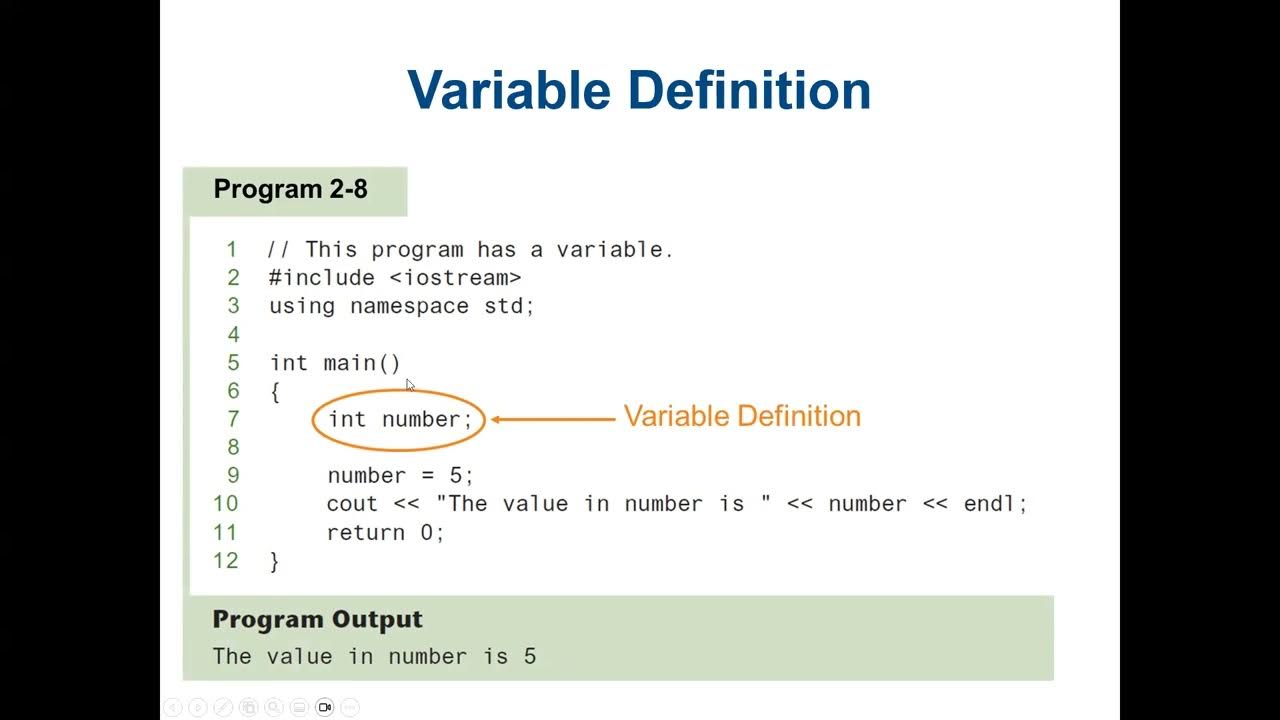C_09 Keywords and Identifiers | Programming in C
Summary
TLDRIn this instructional video on C programming, the presenter explains the concepts of identifiers and keywords, distinguishing between the two. Keywords are predefined reserved words essential for writing C programs, with 32 recognized keywords, including 'int', 'float', and 'break'. The presenter emphasizes that keywords cannot be altered or used as identifiers. In contrast, identifiers are user-defined names for variables, functions, and arrays, with specific naming rules, including the prohibition of special characters and the requirement that identifiers start with a letter or underscore. The video sets the stage for future discussions on data types in C.
Takeaways
- 😀 Keywords in C are reserved words that have predefined meanings and cannot be changed by the user.
- 😀 There are 32 keywords in the C programming language that serve as essential building blocks for writing programs.
- 😀 Examples of keywords include 'int', 'float', 'break', and 'while'.
- 😀 Identifiers are user-defined names for variables, functions, arrays, and other elements in C.
- 😀 Identifiers must start with a letter or an underscore and can contain letters, numbers, and underscores.
- 😀 Special characters (like $, %, and -) are not allowed in identifiers.
- 😀 Identifiers are case-sensitive; 'sum', 'Sum', and 'SUM' are treated as different identifiers.
- 😀 The first 31 characters of an identifier are significant according to ANSI standards.
- 😀 Keywords must be written in lowercase letters, while identifiers can include both uppercase and lowercase letters.
- 😀 Understanding the differences between keywords and identifiers is crucial for effective programming in C.
Q & A
What are keywords in C programming?
-Keywords are reserved words in C with predefined meanings that cannot be changed. They are essential for writing instructions in a program.
How many keywords are defined in ANSI C?
-There are 32 keywords defined in ANSI C.
Can you provide examples of some C keywords?
-Examples of C keywords include `int`, `float`, `break`, `for`, `if`, and `while`.
What is the main purpose of keywords in a C program?
-Keywords serve as the basic building blocks for writing instructions and defining data types in a C program.
What are identifiers in C programming?
-Identifiers are user-defined names for variables, functions, arrays, and structures that help in identifying these entities in a program.
What characters are allowed in an identifier?
-Identifiers can consist of letters, digits, and underscores but must start with a letter or an underscore.
Are identifiers case-sensitive in C?
-Yes, identifiers in C are case-sensitive, meaning `total`, `Total`, and `TOTAL` are considered different identifiers.
What are the rules regarding the first character of an identifier?
-The first character of an identifier must be a letter (a-z, A-Z) or an underscore (_); it cannot be a digit.
What happens if you try to use a keyword as an identifier?
-Using a keyword as an identifier will result in a compilation error, as keywords have fixed meanings in C.
What is the maximum length of an identifier in ANSI C?
-In ANSI C, the first 31 characters of an identifier are significant, meaning only these characters are considered when distinguishing between identifiers.
Outlines

This section is available to paid users only. Please upgrade to access this part.
Upgrade NowMindmap

This section is available to paid users only. Please upgrade to access this part.
Upgrade NowKeywords

This section is available to paid users only. Please upgrade to access this part.
Upgrade NowHighlights

This section is available to paid users only. Please upgrade to access this part.
Upgrade NowTranscripts

This section is available to paid users only. Please upgrade to access this part.
Upgrade NowBrowse More Related Video

C_08 Characters | Identifiers & Keywords in C Language | C Programming Tutorials

Basic Syntax Of A C Program: C Tutorial In Hindi #5

C++ Tutorial - Introduction to C++ | C++ Tutorial For Beginners #c++

CONSTANTS in C++

Introduction to C++, The Parts of a C++ Program, Identifier Naming Rules, output statements

The size of your variables matters.
5.0 / 5 (0 votes)